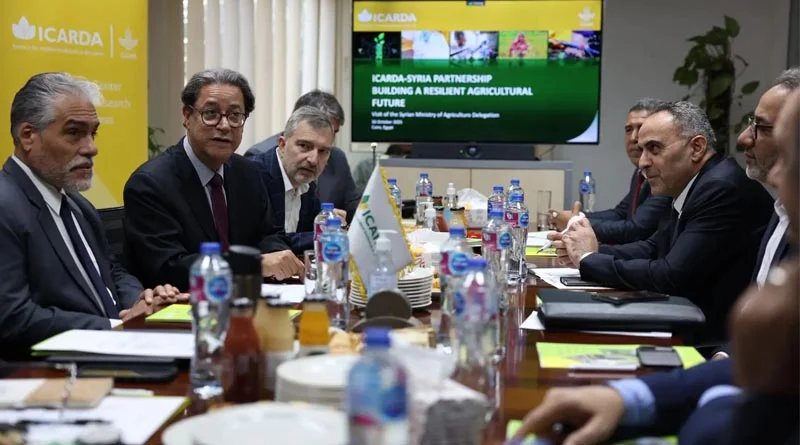Monday, 23 February 2026

The International Center for Agricultural Research in the Dry Areas (ICARDA), in partnership with the Syrian Ministry of Agriculture, convened a high-level consultation to advance the Program for the Rehabilitation of Syria’s Agriculture Sector, a strategic framework designed to restore agricultural systems, research capacity, and rural livelihoods across the country. The session marked one of the most significant multilateral efforts in recent years to align national institutions, global development agencies, and technical partners behind a unified recovery vision.
Held under the patronage of H.E. Dr. Amjad Badr, Minister of Agriculture, the consultation brought together 85 senior representatives from key Syrian ministries, research institutions, seed and farming agencies, universities, and the Farmers Union. Global partners in attendance included FAO, WFP, UNDP, IFAD, JICA, and leading humanitarian and development NGOs such as Oxfam, the Norwegian Refugee Council, the Danish Refugee Council, and the International Committee of the Red Cross (ICRC). The Arab Center for the Studies of Arid Zones and Dry Lands (ACSAD) joined as a core regional partner.
The consultation follows an earlier strategic meeting held in Cairo during Cairo Water Week, where ICARDA Director General Aly Abousabaa briefed the Minister on the recovery framework. The Damascus workshop provided the platform to translate that vision into collaborative planning.
Speaking at the opening of the consultation, Aly Abousabaa emphasized ICARDA’s deep historical roots in Syria and its commitment to restoring agricultural research and innovation capacity in the country. He underscored the need for coordinated action, noting that the rehabilitation plan spans the full agricultural system—from seed production and varietal research to rangeland management, small ruminant revitalization, irrigation efficiency, and value chain rebuilding. He highlighted the symbolic and strategic significance of re-establishing ICARDA’s Tel Hadya Research and Innovation Hub, once a regional benchmark for dryland agricultural science.
H.E. Dr. Amjad Badr, Minister of Agriculture, reaffirmed the government’s commitment to enabling ICARDA’s full return and to advancing agricultural recovery as a national priority. He noted that rebuilding scientific, seed, and extension systems will be essential to restoring food security and farmer resilience, particularly in regions heavily affected by conflict and climatic pressures.
The technical presentation, delivered by Dr. Michael Baum, outlined the program’s core components, including vulnerability mapping of agrarian livelihoods, seed system re-establishment for cereals and legumes, capacity rebuilding in plant breeding, infrastructure rehabilitation, efficient resource management for climate adaptation, livestock and rangeland restoration, market system strengthening, and policy and governance support. The presentation was followed by a high-level panel that stressed the importance of aligning ongoing initiatives under one coordinated national framework, backed by long-term financing and evidence-based implementation.
The discussion reaffirmed that Syria’s agricultural recovery will require shared ownership, sustained institutional cooperation, and investment in farmer-centered solutions. Participants agreed that the next phase will focus on prioritizing interventions, mobilizing co-financing, and establishing joint implementation mechanisms to accelerate progress on the ground.
The workshop concluded with a collaborative call to action: to rebuild agriculture not as a series of isolated projects, but as an integrated national recovery strategy anchored in research, innovation, and resilient production systems.